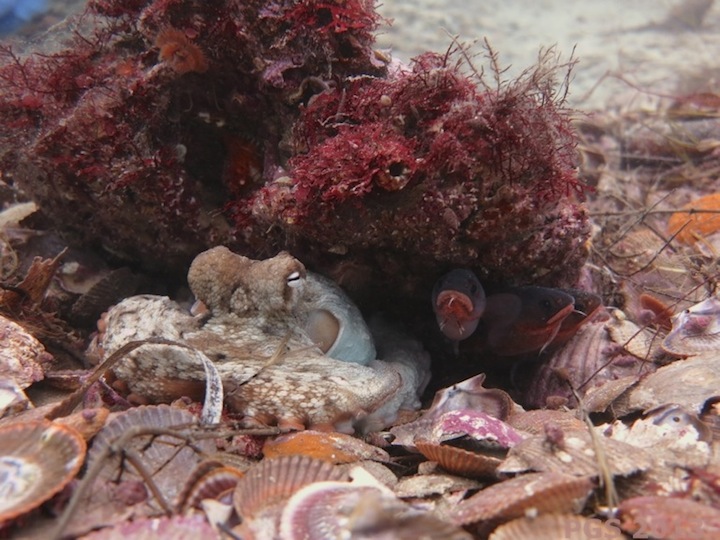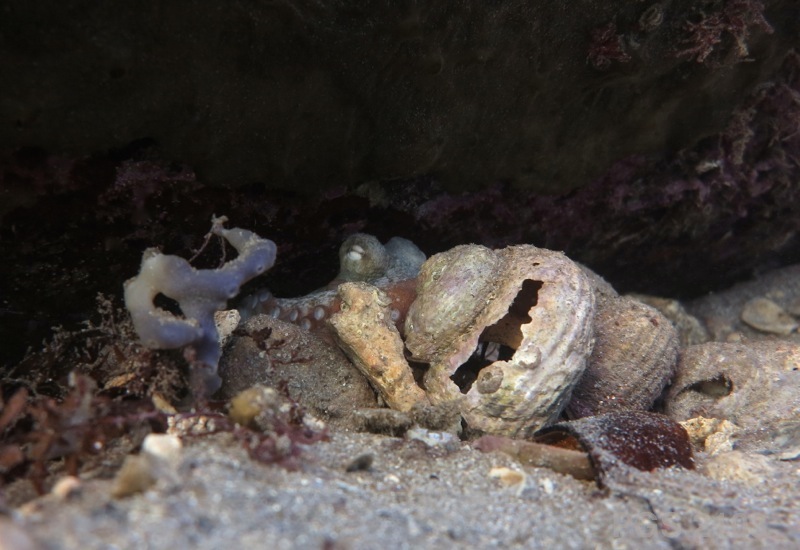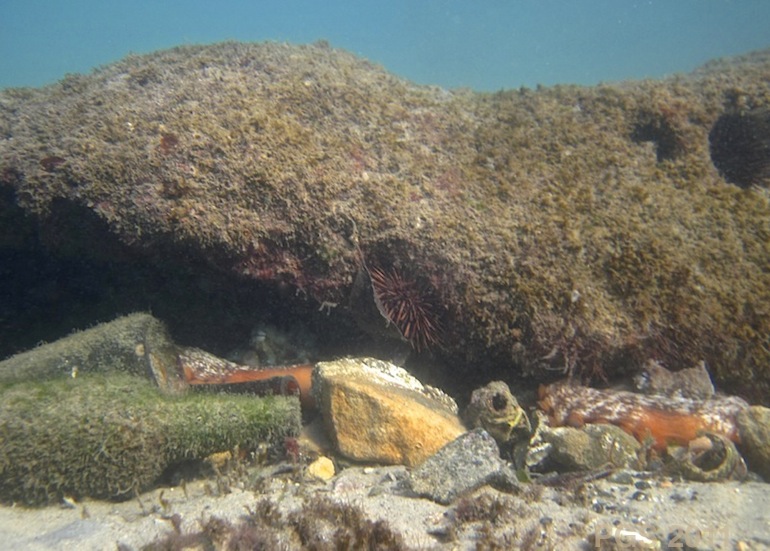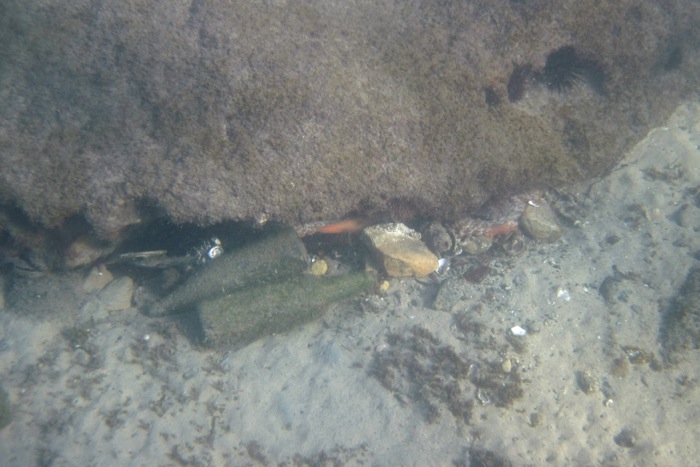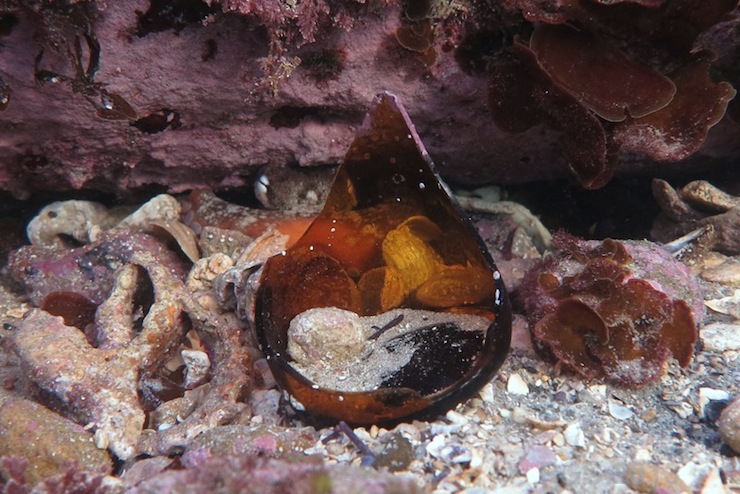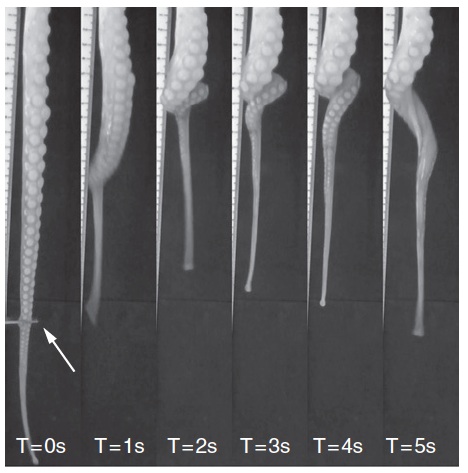33. Dens, Arms, Friends
The previous post discussed the living arrangements of one octopus and three fish at Octopolis, a site in Australia. On our most recent trip we saw there, under a small ledge, an octopus sitting for long periods next to three cod. They sat close enough to be touching. Here again is a photo:
What is the nature of the relationship? The benefit to the fish seems fairly clear: shelter, which is hard to find in that environment. What about the octopus? In the previous post I suggested that most likely there is no real benefit to the octopus, and that the case is one of toleration: the fish are too tenacious to be kicked out, and the octopus is no worse off for their presence.
David Scheel wrote and suggested there might be more to it. Octopuses in general like stimulation and having things to watch. They are also fond of contact. The impression people often have at an aquarium, of captive octopuses enjoying humans coming by and interacting with them, is probably no illusion; they really do prefer to have the stimulation. Octopuses in aquariums also seem to like having fish to observe. Given all that, David said, and given that the octopus in the photo above sits touching these fish, perhaps the fish are not just passively tolerated, but appreciated, even though there is no material benefit from their presence. The fish might be a bit like pets.
I’ll update some other octopus-related themes, while they’re on-stage. In another earlier post I put together photos of octopuses who’d gathered interesting objects to decorate their dens. Here are some more. The octopus below seems to have brought in a piece of blue sponge:
Denise Whatley noticed the intriguing fact that the sponge looks quite a lot like an octopus’ arm, with suckers. Here’s a shot from further away, to show the context:
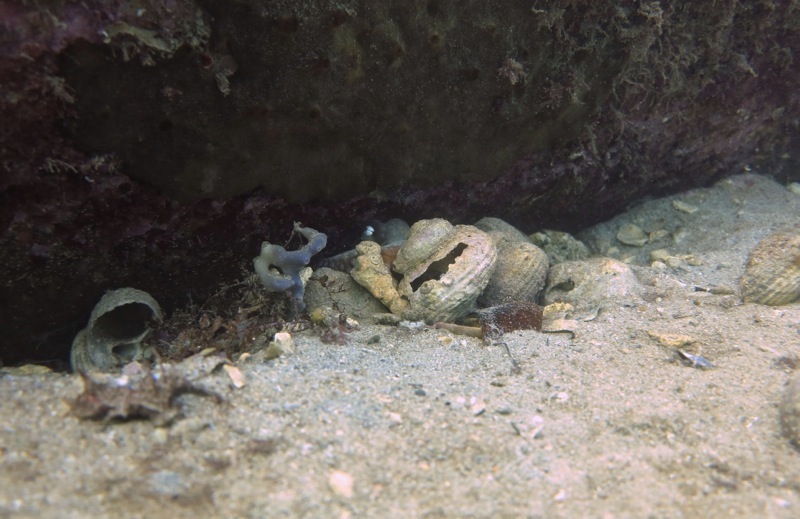 The next shot is from some years ago, taken inside Sydney Harbour. This pair of octopuses, both large, were lying around with a pile of bottles outside their den. It looked like the morning after (or perhaps many mornings after) a boozy party, with no one quite ready to start the clean-up.
The next shot is from some years ago, taken inside Sydney Harbour. This pair of octopuses, both large, were lying around with a pile of bottles outside their den. It looked like the morning after (or perhaps many mornings after) a boozy party, with no one quite ready to start the clean-up.
Here is an aerial view, again to show that the octopuses do seem to have concentrated these objects:
And one more: tinted windows. Or octopus sunglasses:
(again with an accompanying shot from further away).
Lastly, an interesting octopus paper came out this week, which bears on yet another earlier post. The paper is in a special issue of the Journal of Experimental Marine Biology and Ecology, an issue entirely devoted to cephalopods. Octopuses have large brains, but about 2/3 of their neurons are not in the animal’s brain (or head), but in the arms themselves. Discussion has gone on for some time about how much autonomy, how much proto-intelligence, the arms have. In an earlier post, and this article, I discussed a good experiment done a few years ago on this topic by Tamar Gutnick and her colleagues at Benny Hochner’s lab in Jerusalem. That article seems to show that octopuses can exert top-down control over a single arm’s motion when they need to. The new experiment, by Theresa Hague and her colleagues, looks at how an octopus’ arm reacts to various stimuli when it has been severed from the octopus’ body. Isolated arms were tested by pinching, and exposure to mild doses of chemicals (tap water, vinegar). The individual arms did respond, rapidly retracting. As the paper emphasizes, the arms withdrew in many cases by establishing an “elbow” quite far from the affected region, and pulling or curling back on that elbow. Here’s an image from the paper, with time running left to right:
The paper compares the responses of arms to “noxious” and neutral stimuli. As far as I can see, they did not see how an isolated arm might react to a desirable stimulus – a piece of crab might be the thing to try.
The experiment is quite macabre to read about, and a report on the website i09 (a site with strong cephalopod sympathies) expresses a kind of horror at what was done. Much of the special issue of the journal, though, is written in the light of the new European Union rules on the use of cephalopods as experimental animals – rules requiring the careful use of anaesthesia, and much more humane treatment of octopuses than before.

